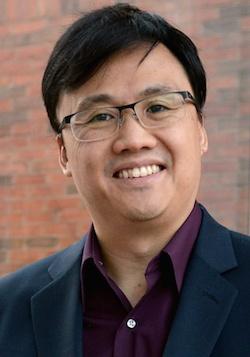
Credit: Thayer School of Engineering at Dartmouth
Using artificial intelligence (AI) to cure cancer may sound like science-fiction, but Eugene Santos Jr., a professor of engineering at Dartmouth, disagrees. Santos is the Principal Investigator of a newly-funded project from the National Institutes of Health (NIH) to develop such a tool, dubbed the Pathway Hypothesis Knowledgebase (PHK), with anticipated funding totaling $3.4 million for up to five years.
Santos is collaborating with Dartmouth Engineering colleagues along with Joseph Gormley, Director of Advanced Systems Development at Tufts Clinical and Translational Science Institute (CTSI) and his colleagues, as well as industry partner IOMICS, to develop an AI-based system that analyzes patients’ clinical and genomic data and the relationship between biochemical pathways that drive health and disease. “We’re trying to find new connections that people have not seen,” said Santos. “We believe this system will generate new insights, accelerating the work of the biomedical researcher.”
Santos imagines many uses for PHK once it is completed, for example, doctors could treat a patient using historical data of other patients with similar symptoms and genomic profiles. In addition, PHK could be used to determine additional uses for approved drugs already on the market, and could quickly determine possible drug treatments to new diseases, such as COVID-19. Santos hopes to have PHK in the hands of personal physicians in the next decade. “We will impact how we treat cancer and a multitude of complex multi-faceted diseases,” said Santos.
Earlier this year, the team received funding to develop a fully-functioning PHK prototype that draws data from clinical research and NIH’s National Center for Advancing Translational Sciences (NCATS) program. PHK forms new, sophisticated links between all data and knowledge sources in order to provide measurable and reliable recommendations for individual patients. PHK’s easy-to-use interface employs many features in order to answer a medical researcher’s query, such as the effectiveness of a certain drug combination for a given patient’s clinical and genetic profile.
Importantly, despite receiving sometimes inconsistent or contradictory sets of data, PHK ensures that no information is lost, ensuring completeness. “There’s so many different ways of measuring and testing things, so data isn’t necessarily reported properly. There’s so much we don’t know, so what we hope to do with PHK is add to that knowledge,” said Santos, who also mentioned that the team is working hard to ensure that PHK is a transparent AI system, meaning the reasoning behind the computation is easily explainable to a healthcare worker.
The researchers presented their completed prototype in March and were notified in June that they had been selected to continue their research. In the coming years, the team hopes to employ the prototype with additional analytical, reasoning, and learning tools that are being developed by other groups to build the Biomedical Data Translator and together, fully validate the system for use by clinical and translational researchers.
Media Contact
Julie Elizabeth Bonette
[email protected]
Original Source
https:/




